Plain sailing: Boating holidays on the rise across the UK
- Published
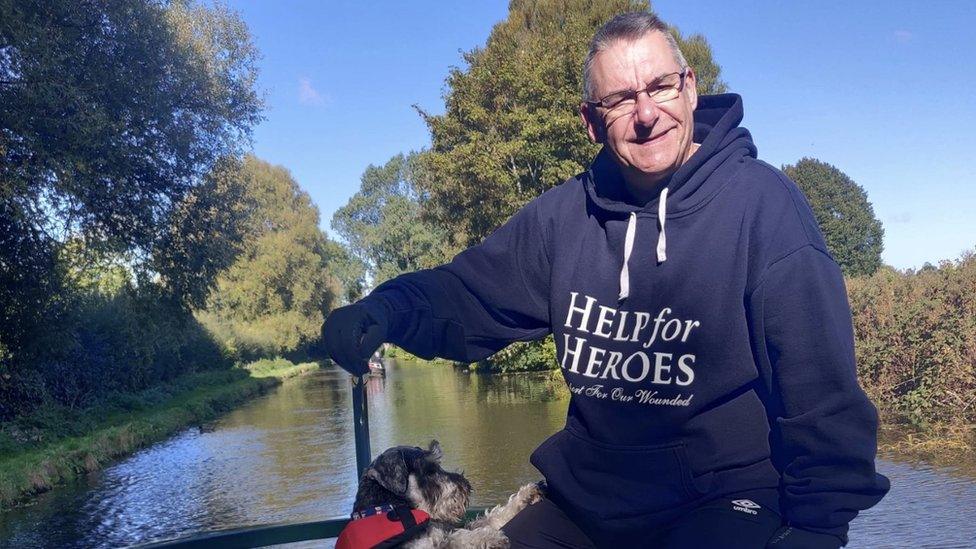
Adrian Ellis and his dog Charlie Bucket are off on another boating holiday next month
Adrian Ellis says that going on his first canal boat holiday was "a surreal experience".
Last autumn the 59-year-old was due to go on a Caribbean beach holiday in the Dominican Republic with his wife Carol and daughter Amy.
But with the coronavirus pandemic grounding international flights, the family went on a "staycation" in the UK instead.
Rather than booking a hotel, holiday home or campsite pitch they decided to hire a narrow boat.
"I'd always wanted to go on a boating holiday," says Mr Ellis, who works as a toll booth supervisor on the Humber Bridge. "Now I had the opportunity."
So last September, the Ellises - and their dog - spent seven days cruising along the Staffordshire and Worcestershire Canal.
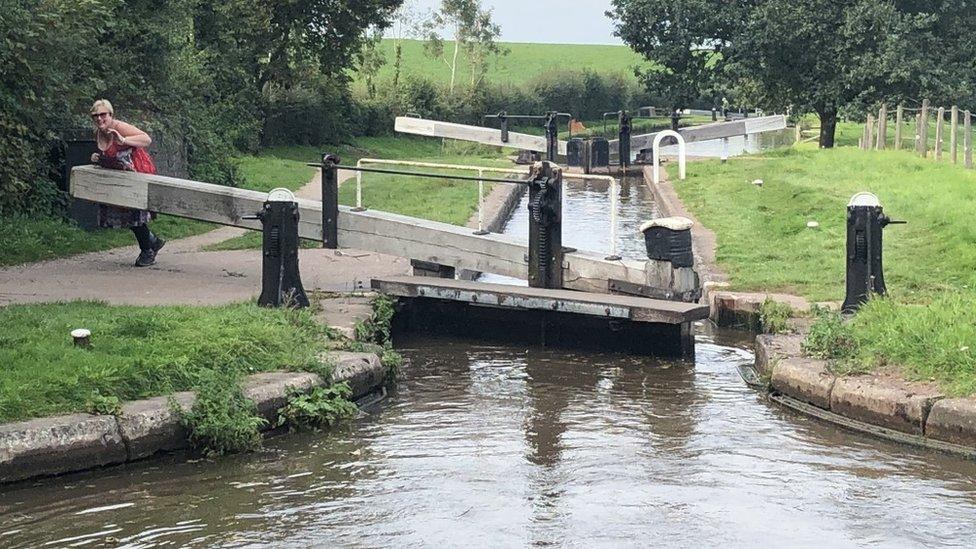
Mr Ellis says it took a while for him and wife Carol, pictured here, to get to grips with working the locks
"Modern-day life is like a rat race, yet there we were travelling at 3mph [5km/h]," says Mr Ellis. "It was so peaceful and tranquil. You see the countryside from a different perspective... it was totally different to our usual holidays."
He adds that it was "so infectious" that the three will return to the same canal next month.
They are not the only ones now taking to the inland waterways of mainland UK for their holidays. Boat hire firms say that bookings across the country's 4,700 miles (7,500km) of navigable canals and rivers, external have swelled since the pandemic.
ABC Leisure Group provides narrow boats for hire from 15 inland marinas across England, Scotland and Wales. Managing director Carl Onens says that sales this year and last are 40% higher than in 2019 - despite losing the 15-20% of annual bookings it used to get from international customers.
"We were seeing strong demand till March 2020, and then the pandemic accelerated it with lots of new customers coming in," he says.
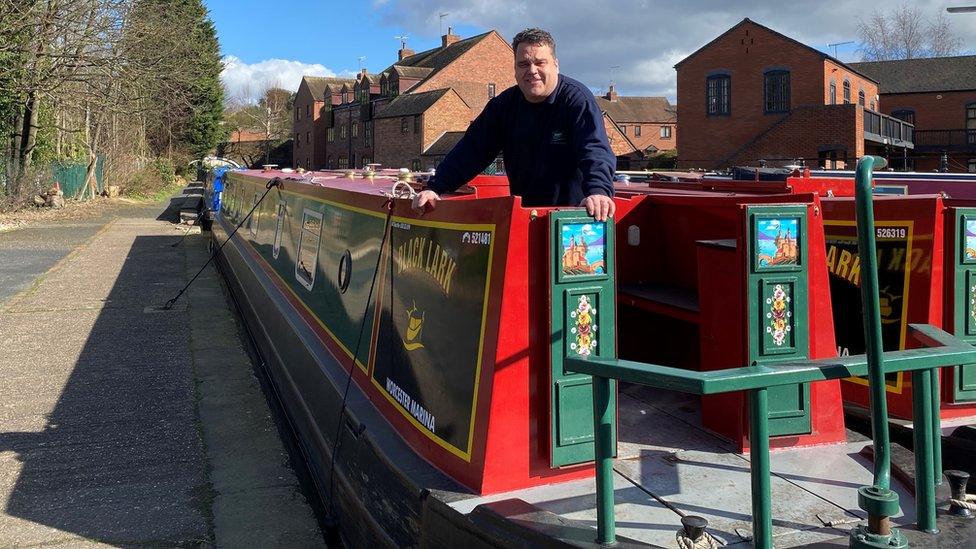
Carl Onens says his firm's bookings have shot up
"New customers is what we've worked on for a long time, although we would not have chosen a global pandemic [to achieve it]."
Yet with the numerous lockdowns putting temporary stops to any domestic holidays, Mr Onens says it has not all been plain sailing. "The booking office has often been dealing four to five times with same bookings, as a result of changes in the rules.
"It's been interesting. We have refunded about £1.6m in total - it was the fairest thing for our customers. But as it happened we've resold holidays as fast as we've refunded them."
Cheryl Howes, owner of Warwick-based narrow boat hire company Kate Boats, which operates 28 boats, says the 21-year-old business hasn't "seen bookings like this for 10 years".
"Although we have bits and pieces available, we're full for this summer," she says. "Some people want to travel abroad but don't want to risk it, and others are looking for something different and unusual.
"You've got everything you need. The boat is your holiday. You don't have to think, don't have to make decisions, you just enjoy it. People think kids will get bored, but they enjoy having you to themselves."
Mr Onens, who says many people discovered canal holidays after walking the towpaths during the pandemic, describes boating trips as the "perfectly socially distanced break".
"You're in a bubble, not like a holiday park with a lot of people. It's an experience holiday with miles of canal to explore. It's something unique and different."
Eulanda Shead Osagiede, 42, from Snodland in Kent, took her first boating holiday in June - going on a four-day cruise with workmates along the Thames, from Chertsey in Surrey to Benson in Oxfordshire.
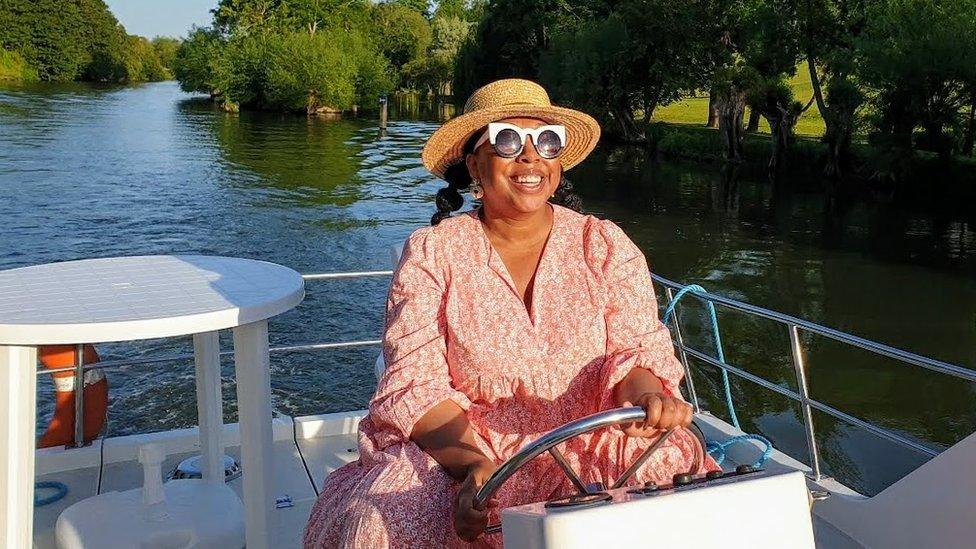
Eulanda Shead Osagiede says that most people she met on the Thames were "lovely"
The digital content creator describes the experience as "fun and enjoyable", but she is also upfront about some challenges. "At times it was stressful approaching the locks [there are 45 on the Thames] when there was a lot of traffic coming from the other side, or behind us."
The group of six women also say they faced some sexism. "It did seem to be male-dominated, with men manning the boats, and there was a sense of 'oh, let me help you out, you ladies'," says Ms Osagiede.
"There were times we did need help... other times it was patronising. But for the most part everyone was lovely."
Mr Ellis says the most difficult thing to begin with, was trying to navigate canal locks, external. The locks enable canals to go up and over rising terrain, and often require someone to get off the boat and physically turn or push a handle or "paddle" to open or shut the canal gates.
Although the boat hire companies give customers an induction, these generally last less than an hour and then it is up to holidaymakers to tackle locks on their own.
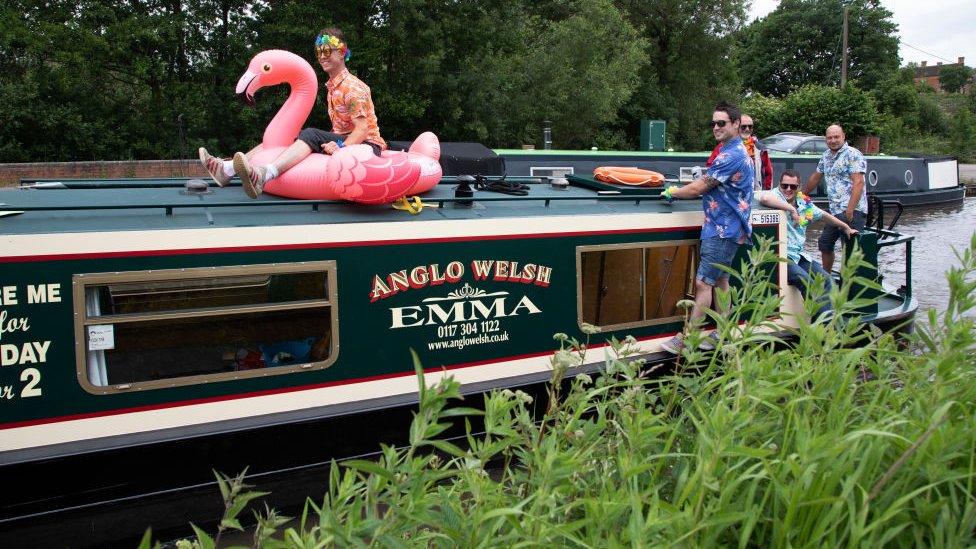
A growing number of people are renting canal boats
"It was nerve-wracking to start with," says Mr Ellis. Ms Howes adds that "you do need at least one fit crew member" to handle the locks".
Matthew Symonds, national boating manager of the Canal & River Trust, says it is vital that people "listen to the handover instructors", be it regarding the locks or general safety issues. "It's just about being aware of other people and being considerate. Think of all different users, such as people who live on boats and kayakers."


New Economy is a new series exploring how businesses, trade, economies and working life are changing fast.

Yet are the boat hire companies worried about sales drying up once restrictions on overseas travels eventually loosen? Hardly.
"We're seeing record bookings for next year," says Mr Onen. "Normally people would be focused on this year, but we have sold 530 weeks for next year already, compared to about 50 weeks usually [by this stage].
"A few are deferred tips from March but most are new bookings. We'll also see the return of overseas visitors, and a boating trip makes an ideal second holiday for people even if they do go abroad."
And many new boaters like Mr Ellis and Ms Osagiede are keen to return to the waters again.
"I'm already planning another trip with my workmates," says Ms Osagiede. "And then I'm planning one with my husband for when my parents visit, as they love boating.
"Every time I speak to my friends about it they want to do it as well. It's a great activity for all age groups."